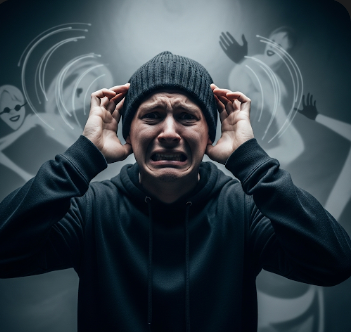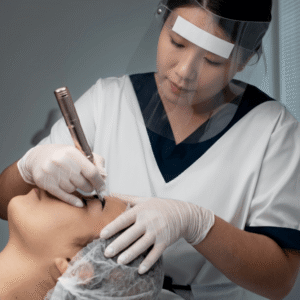Overview
Auditory hallucinations refer to the perception of hearing sounds, voices, or noises without an external source. They are among the most common types of hallucinations and often occur in psychiatric disorders, neurological conditions, or as a result of substance use. While hearing voices can be distressing, early recognition and proper treatment can significantly improve outcomes.
In South Korea, psychiatric and neurology clinics provide diagnostic evaluations, therapy, and medication management for individuals experiencing auditory hallucinations, with multidisciplinary support for mental health and neurological conditions.
Key Facts
Highlights:
➡️ Auditory hallucinations involve hearing sounds that are not present in the environment.
➡️ Most commonly associated with schizophrenia, bipolar disorder, and severe depression.
➡️ Can also occur in neurological disorders such as epilepsy, dementia, or brain lesions.
➡️ Substance use, including alcohol and drugs, may trigger or exacerbate hallucinations.
➡️ Early psychiatric or neurological evaluation improves treatment outcomes.
What is Auditory Hallucination?
An auditory hallucination is perceiving sounds or voices without an external stimulus. These hallucinations can vary in complexity:
- Simple: Hearing noises, buzzing, or indistinct sounds.
- Complex: Hearing clear voices or conversations, sometimes commanding or commenting.
- Negative or distressing voices: Can instruct harmful actions or provide threatening content.
Auditory hallucinations are considered a core symptom of psychotic disorders but can also occur in non-psychotic conditions due to metabolic imbalances, neurological disorders, or sensory deprivation.
What Symptoms are Related to Auditory Hallucinations?
Symptoms often co-occur with underlying psychiatric or neurological disorders:
- Hearing voices, whispers, or music without external source
- Feeling of being followed, watched, or spoken about
- Anxiety, fear, or distress associated with the hallucinations
- Difficulty concentrating or disrupted thought processes
- Sleep disturbances or insomnia
- Social withdrawal or avoidance behaviors
- Mood changes such as depression or irritability
What Causes / Possible Causes of Auditory Hallucinations?
Highlights:
➡️ Psychiatric Disorders: Schizophrenia, schizoaffective disorder, bipolar disorder, severe depression with psychotic features.
➡️ Neurological Conditions: Epilepsy (especially temporal lobe seizures), Parkinson’s disease, dementia, brain tumors, or stroke.
➡️ Substance Use: Alcohol, cannabis, stimulants, hallucinogens, or withdrawal from drugs.
➡️ Medical Conditions: Metabolic disturbances, high fever, infections affecting the CNS.
➡️ Sensory Deprivation: Hearing loss or social isolation can sometimes trigger hallucinations.
➡️ Trauma or Severe Stress: PTSD or acute stress can precipitate auditory hallucinations in vulnerable individuals.
When Should I See My Doctor?
Highlights:
➡️ If you hear voices or sounds that others do not hear.
➡️ If hallucinations are distressing, persistent, or affecting daily life.
➡️ For evaluation of underlying psychiatric or neurological conditions.
➡️ If hallucinations are accompanied by confusion, disorientation, or cognitive changes.
➡️ Early intervention improves prognosis and reduces the risk of severe psychosis.
➡️ Family members noticing behavioral changes should encourage prompt medical assessment.
Care and Treatment
Management focuses on addressing the underlying cause and reducing distressing symptoms:
Highlights:
➡️ Psychiatric Medications: Antipsychotics, mood stabilizers, or antidepressants depending on diagnosis.
➡️ Psychotherapy: Cognitive-behavioral therapy (CBT) for psychosis can help patients cope with voices.
➡️ Neurological Treatment: Management of epilepsy, dementia, or other CNS disorders causing hallucinations.
➡️ Substance Use Management: Detoxification and rehabilitation for drug or alcohol-induced hallucinations.
➡️ Supportive Care: Counseling, social support, and stress reduction techniques.
➡️ Monitoring and Follow-Up: Regular psychiatric or neurological assessment to track symptom progression.
➡️ Education for Patients and Families: Understanding the condition, triggers, and coping strategies.
Treatment Options in Korea
South Korea offers advanced mental health and neurological care for auditory hallucinations:
Highlights:
➡️ Psychiatric Clinics: Diagnosis, medication management, and psychotherapy services.
➡️ Neurology Centers: Evaluation for epilepsy, brain lesions, or neurodegenerative conditions.
➡️ Substance Use Clinics: Detoxification programs and rehabilitation support.
➡️ Advanced Imaging: MRI, CT, and EEG to identify neurological causes.
➡️ Multidisciplinary Care: Collaboration between psychiatrists, neurologists, psychologists, and social workers.
➡️ Rehabilitation and Support Programs: Community support, counseling, and occupational therapy to improve quality of life.
➡️ Medical Tourism Support: Multilingual consultations, structured treatment plans, and follow-up care for international patients.













